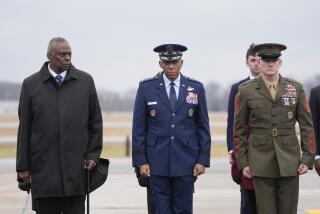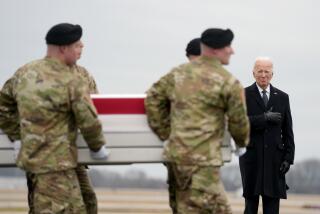16 Killed in Bombing at Police Checkpoint
- Share via
BAGHDAD — A suicide car bomb detonated Saturday outside the gates of a Marine base in western Iraq, killing at least 16 Iraqi police officers and wounding 40 people at a police checkpoint.
In northern Iraq, there were several bloody attacks, including one in Mosul that killed two truck drivers.
Meanwhile, U.S. Marines said they had captured a top lieutenant of Jordanian militant Abu Musab Zarqawi in an early morning raid in Fallouja, and authorities reported successes in a weapons buyback program in a volatile Baghdad neighborhood.
The deadly car bomb near Baghdadi, about 140 miles west of Baghdad, the capital, exploded about 7 a.m. outside the Al Asad air base, U.S. and Iraqi officials said. No Marines were injured in the blast, officials said.
In Mosul, two truck drivers -- at least one of whom was Turkish -- were killed and two others were wounded in the attack on a convoy. A survivor said the convoy had just delivered a shipment of biscuits to a U.S. military base and was heading back to Baghdad about noon when gunmen in a speeding BMW opened fire.
In a second suicide car bombing, four Iraqi national guardsmen were killed and six others injured near a checkpoint south of Samarra, Associated Press reported.
The flurry of attacks against Iraqi and U.S. military targets came as U.S. Marines continued a months-long series of strikes against suspected militant hide-outs, meeting places and weapons storage sites in the rebel stronghold of Fallouja.
In a raid about 1:30 a.m. Saturday, Marines reported capturing a member of Zarqawi’s “inner circle.” Until recently, the individual was considered to be a minor player in the insurgent network but rose to a senior position with the death or capture of a number of suspects in U.S. attacks, a military statement said.
Fallouja residents said Marines raided the home of Abdel-Hamid Fiyadh, 50, who was arrested with his two sons, Walid, 18, and Majid, 25, and three other relatives, Associated Press reported. Relatives denied that the men had anything to do with Zarqawi. A U.S. military statement Saturday said Zarqawi was responsible for the “most heinous suicide bombings, mortar attacks, kidnappings and shootings that have claimed hundreds of Iraqi lives.
“This past week, a group led by Zarqawi pledged allegiance to Osama bin Laden and said it was in contact with Al Qaeda over operations in Iraq,” the statement said.
The U.S. has offered a $25-million reward for Zarqawi’s killing or capture and has stepped up efforts to destroy his network and wrest control of Fallouja before national elections, planned for January. Britain has approved a U.S. request to move 850 troops from Iraq’s south to an area near Baghdad, which will free American forces for a planned offensive in Fallouja.
In Baghdad, several explosions were heard Saturday, including one from a rocket that hit the offices of the Iraqi Bar Assn., blowing a hole in the ceiling and spreading glass and rubble in all directions. The strike occurred at 10:30 a.m. in the upscale Mansour district, an Iraqi national guard officer said. Officials suspected the missile was intended for a nearby national guard headquarters.
Also Saturday, officials announced that more than 9,000 weapons had been gathered in a nearly two-week buyback program in Baghdad’s Sadr City neighborhood, a hub of anti-U.S. violence since the invasion of Iraq last year. Deputy Prime Minister Barham Salih said that $5 million had been spent on the buyback program. The haul included 2,000 AK-47 rifles, 2,000 rocket-propelled grenades and 1,000 grenade launchers. A U.S.-sponsored weapons buyback in May led to a payout of $1.35 million.
Both U.S. and Iraqi officials said they were cautiously optimistic about the success of the arms buyback, which is part of a plan to restore peace and order to the volatile Shiite Muslim neighborhood, a stronghold of cleric Muqtada Sadr.
“We are hoping to expand this successful initiative to other cities around Iraq,” Salih said. “This gives a chance to all Iraqis who have unlicensed arms to trade them off for money.”
Authorities said it was impossible to determine whether the bulk of the weapons came from Sadr City or were turned in by weapons dealers and others from elsewhere in the capital and throughout Iraq.
U.S. commanders cautioned that the next step -- a planned search of houses in Sadr City for weapons -- would be a better gauge of whether large caches of arms and weapons remained. Officials are also anxious to see the removal of about 1,000 roadside bombs believed to have been placed in the streets of Sadr City to thwart U.S. patrols.
Once the threat is reduced, U.S. officials plan to move ahead with multimillion-dollar water, sewer and other projects in Sadr City -- all held up by the violence.
*
Times staff writer Patrick J. McDonnell and special correspondent Roaa Ahmed contributed to this report; Associated Press was used in compiling it.
More to Read
Sign up for Essential California
The most important California stories and recommendations in your inbox every morning.
You may occasionally receive promotional content from the Los Angeles Times.








